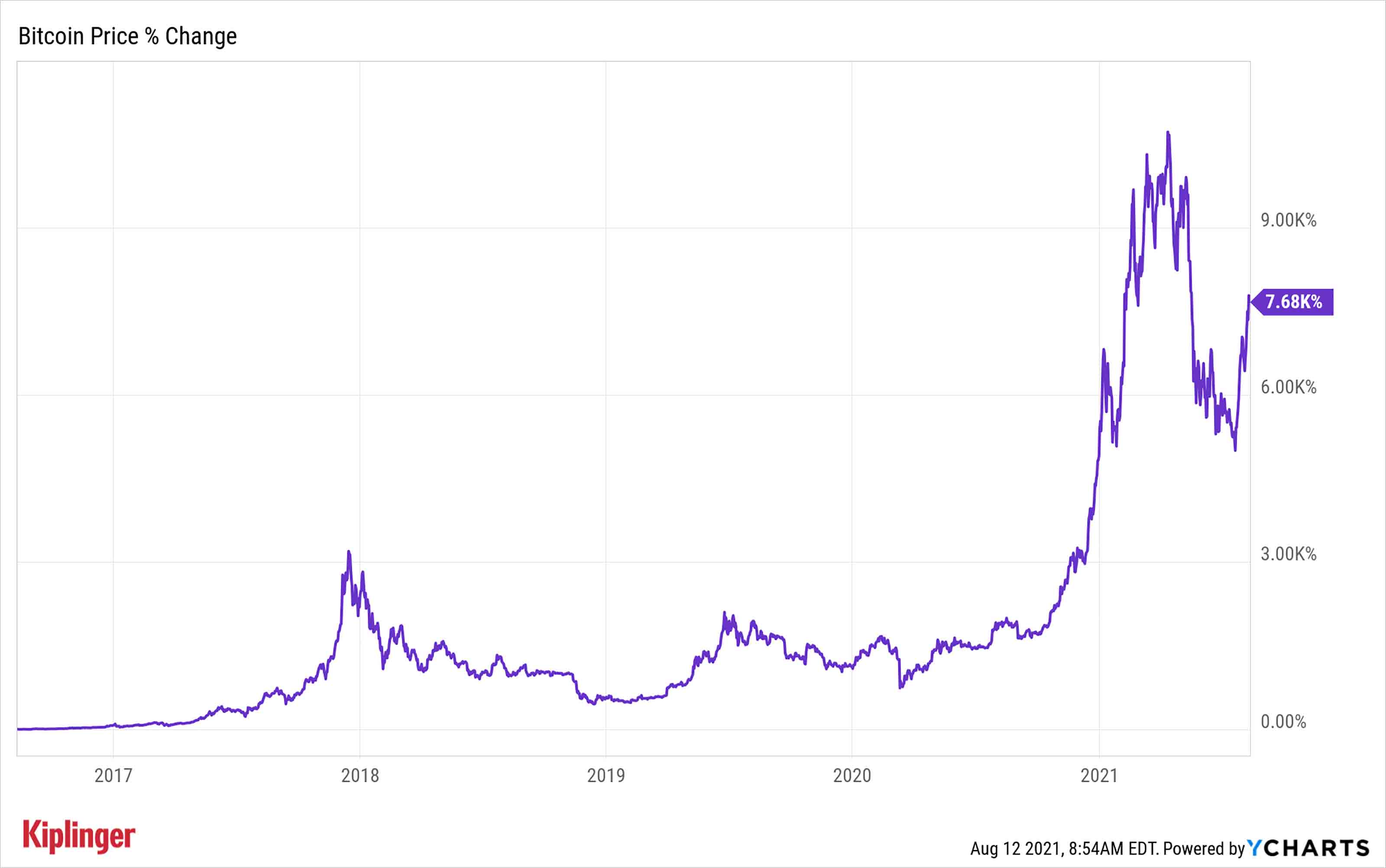Why Are Bitcoin Prices So Volatile?
Bitcoin and other cryptocurrencies rarely sit still. Here are four of the most pressing reasons as to why.


Profit and prosper with the best of Kiplinger's advice on investing, taxes, retirement, personal finance and much more. Delivered daily. Enter your email in the box and click Sign Me Up.
You are now subscribed
Your newsletter sign-up was successful
Want to add more newsletters?

Delivered daily
Kiplinger Today
Profit and prosper with the best of Kiplinger's advice on investing, taxes, retirement, personal finance and much more delivered daily. Smart money moves start here.

Sent five days a week
Kiplinger A Step Ahead
Get practical help to make better financial decisions in your everyday life, from spending to savings on top deals.

Delivered daily
Kiplinger Closing Bell
Get today's biggest financial and investing headlines delivered to your inbox every day the U.S. stock market is open.

Sent twice a week
Kiplinger Adviser Intel
Financial pros across the country share best practices and fresh tactics to preserve and grow your wealth.

Delivered weekly
Kiplinger Tax Tips
Trim your federal and state tax bills with practical tax-planning and tax-cutting strategies.

Sent twice a week
Kiplinger Retirement Tips
Your twice-a-week guide to planning and enjoying a financially secure and richly rewarding retirement

Sent bimonthly.
Kiplinger Adviser Angle
Insights for advisers, wealth managers and other financial professionals.

Sent twice a week
Kiplinger Investing Weekly
Your twice-a-week roundup of promising stocks, funds, companies and industries you should consider, ones you should avoid, and why.

Sent weekly for six weeks
Kiplinger Invest for Retirement
Your step-by-step six-part series on how to invest for retirement, from devising a successful strategy to exactly which investments to choose.
Life as a bitcoin (BTC) investor can be a bumpy ride. The world's most famous cryptocurrency has confounded commentators since its inception in 2009 to climb to mind-bogglingly high values, but bitcoin prices have nonetheless still been punctuated by a high level of volatility.
The wild price swings associated with BTC and the wider world of cryptocurrency has meant that, despite bitcoin's price hitting new all-time highs throughout the past year, many investors in the currency have lost money amid harsh pullbacks and wildly fluctuating processes.
Bitcoin has regularly suffered 30% to 40% bear markets across its short history. And although the cryptocurrency has become significantly more popular in recent months and years – with significant investments arriving from institutional investors and publicly traded companies such as Tesla (TSLA) and MicroStrategy (MSTR) – we can still see evidence of volatility.
From just $107.88 $24.99 for Kiplinger Personal Finance
Become a smarter, better informed investor. Subscribe from just $107.88 $24.99, plus get up to 4 Special Issues

Sign up for Kiplinger’s Free Newsletters
Profit and prosper with the best of expert advice on investing, taxes, retirement, personal finance and more - straight to your e-mail.
Profit and prosper with the best of expert advice - straight to your e-mail.
In May 2021, for instance, bitcoin prices plunged by more than half; over the past month, however, they've rallied by more than 40%.

But how volatile is bitcoin, really?
As recorded by the Bitcoin Volatility Index – a metric that monitors how far bitcoin deviates from its mean price – some degree of volatility has followed bitcoin since its inception. This is calculated using standard deviation, which is calculated as the square root of variance by determining each data point's deviation relative to the mean.
Understandably, the early years of the cryptocurrency were punctuated by large price swings that would regularly deviate beyond 10% of bitcoin's daily returns. We can see evidence of less volatility in BTC following its late 2017 rally and subsequent pullback, with the coin only surpassing this 10% deviation barrier once since then.
This gradual calming influence is largely attributed to the arrival of more institutional investors into the cryptocurrency ecosystem. Theoretically, as more money is invested, the more stable BTC prices will become.
Regardless, bitcoin (and other cryptocurrencies) still is capable of delivering massive price swings. So what causes this volatility? And will it calm down further? Let's take a deeper look at why cryptocurrencies rarely sit still:
1. A Market Built Heavily on Sentiment
The first and perhaps most important thing to consider about bitcoin is that it has no intrinsic value. This means that it can't be quantified through traditional valuation methods such as discounted cash flows. And although bitcoin is sometimes compared to gold in being considered a "store of value," it doesn't have any physical presence.
While there are a number of growing use cases to bitcoin, there's still no clear value to attach to bitcoin prices. Thus, the currency's movements are more susceptible to sentiment and narrative.
We've already seen the power of sentiment create much volatility across traditional stock markets in 2021. The GameStop (GME) short squeeze in January was caused by a collection of retail investors coordinating themselves via social media to collectively buy a specific stock to boost its price.
This freedom for investors to communicate and invest according to their beliefs – which has long been a facet of cryptocurrency markets – shows that sentiment is changing finance across the board. Although this ecosystem is largely populated by retail investors, institutional money is beginning to tap into these online conversations to gauge sentiment. It has even become commonplace to see established news channels speculating on what the next "meme stock" to pump will be.
But sentiment can work both ways.
While bitcoin prices can rocket on a whim, they can also fall heavily for seemingly little or no reason. Without being pegged to a tangible value like in the case of gold, these changes in sentiment can affect bitcoin in a more extreme way than its traditional stock market counterparts.
In a similar vein ...
2. Bad News Causes Panic, Not Pause
The acronym FUD – fear, uncertainty and doubt – is used across a number of topics, and has been adopted by the cryptocurrency community to denounce what supporters see as the intentional spread of misinformation. (Conversely, skeptics write off the term as a defense mechanism for investors to brush off negative news.)
Whether it's a case of FUD or a genuine piece of bad news, headlines that directly or even indirectly concern bitcoin can scare the cryptocurrency's users into panic selling on a scale that can trigger a period of significant volatility.
There's no shortage of headlines behind the wild fluctuations in bitcoin prices. Stories such as the bankruptcies of crypto exchanges Mt. Gox in 2014 and Yapian Youbit in 2017 shook investors. The well-documented use of bitcoin in drug transactions via Silk Road resulted in an FBI shutdown of the marketplace back in October 2013.
Again, even though some of these events weren't directly linked to bitcoin, the public panic that immediately followed heavily affected the value of BTC.
Despite this, seasoned cryptocurrency investors believed that such stories were evidence of the market maturing beyond its chaotic formative years. In their minds, as cryptocurrency evolves, the insecure exchanges and underhanded practices in the industry are stamped out. This, the argument goes, actually helped to create a stronger sentiment that pushed the price of bitcoin higher again longer-term.
3. Lack of Regulation
Bitcoin, like virtually all cryptocurrencies, is built on distributed blockchain technology. While the technology is complex, its fundamental meaning isn't: Blockchain technology can decentralize assets like bitcoin and other coins.
Because blockchains are spread across many different machines all around the world, it means that cryptocurrencies don't have a single centralized location. Thus, it's very difficult for established regulatory frameworks to control them.
This isn't to say that governmental regulatory efforts to stem the growth of cryptocurrencies like bitcoin don't have an effect on sentiment surrounding the value of coins. They do. There are many instances of a cryptocurrency's growth being cut by a government tightening its policies on crypto. Recent restrictions imposed by China contributed to a period of severe volatility in bitcoin prices.
But cryptocurrencies are naturally freewheeling assets that aren't directly governed by international borders or certain central agencies within a government. This presents a problem for policymakers who are accustomed to dealing with clear-cut definitions for assets.
Gary Gensler, the chairman of the U.S. The Securities and Exchange Commission, recently told a House committee there are gaps in the system. He pointed out that there's a need for legislation to specify which regulator should oversee crypto exchanges. Gensler mentioned that the SEC "taken and will continue to take our authorities as far as they go."
This means that popular cryptocurrency exchanges such as Coinbase (COIN) and Binance might find themselves spending millions of additional dollars to ensure they are compliant.
Meanwhile, controversial provisions pertaining to cryptocurrency taxation and reporting requirements made it into the Bipartisan Infrastructure Investment and Jobs Act – a roughly $1 trillion infrastructure bill. Cryptocurrency advocates worried that the definition of a single word ("broker") in the bill could unjustly punish digital-coin "miners" and other people in the cryptocurrency chain, prompting an amendment to quell these concerns. But that amendment was killed before the Senate passed the bill on to the House.
4. Investor Experience
Another key factor behind volatility in bitcoin prices and the rest of the crypto market is the profile of investors who are immersed in the industry.
Unlike in some more traditional markets (think real estate), the barriers to entry in crypto are significantly low. There's no need for lawyers, trading licenses or a minimum level of capital to invest. In this regard, anyone with access to the internet can dive in and begin trading.
Moreover, the post-COVID investing landscape has seen a huge rise in the number of retail investors looking for fast-appreciating assets to put their newfound savings into.
"What we have analyzed above actually looks like the consequence of the pandemic and the stimulation packages that followed," Maxim Manturov, head of investment research at Freedom Finance Europe, tells FinSMEs. "This created a pool of funds retail investors could start investing into stocks. As per Fidelity report, there were 26M retail accounts in 2020, i.e. up 17% compared to 2019, while the daily trading volume doubled."
Statista data shows similar movement in digital wallets – a sign that more retail investors are diving into the industry in the wake of the pandemic.
However, the more retail investors that enter the fray, the less experienced the market becomes. This is part of the reason why cryptocurrency markets can be especially volatile during periods of hype or FUD – where experienced traders might keep their cool, new arrivals might panic during price volatility and look to sell – and it also means crypto markets can be more susceptible to manipulation through misinformation.
Despite the arrival of big institutional investors over the past months and years, bitcoin still is susceptible to volatility. However, with a little bit more of an understanding about what causes such wild swings, you should be better prepared to keep your cool and navigate intelligently through the chaotic crypto landscape.
Dmytro is a tech and finance writer based in London. His work has been published in The Diplomat, IBM, Investing.com, FXEmpire, Investment Week and FXStreet.
Profit and prosper with the best of Kiplinger's advice on investing, taxes, retirement, personal finance and much more. Delivered daily. Enter your email in the box and click Sign Me Up.

Dmytro is a tech and finance writer based in London. His work has been published in The Diplomat, IBM, Investing.com, FXEmpire, Investment Week and FXStreet.
-
 How Much It Costs to Host a Super Bowl Party in 2026
How Much It Costs to Host a Super Bowl Party in 2026Hosting a Super Bowl party in 2026 could cost you. Here's a breakdown of food, drink and entertainment costs — plus ways to save.
-
 3 Reasons to Use a 5-Year CD As You Approach Retirement
3 Reasons to Use a 5-Year CD As You Approach RetirementA five-year CD can help you reach other milestones as you approach retirement.
-
 Your Adult Kids Are Doing Fine. Is It Time To Spend Some of Their Inheritance?
Your Adult Kids Are Doing Fine. Is It Time To Spend Some of Their Inheritance?If your kids are successful, do they need an inheritance? Ask yourself these four questions before passing down another dollar.
-
 If You'd Put $1,000 Into AMD Stock 20 Years Ago, Here's What You'd Have Today
If You'd Put $1,000 Into AMD Stock 20 Years Ago, Here's What You'd Have TodayAdvanced Micro Devices stock is soaring thanks to AI, but as a buy-and-hold bet, it's been a market laggard.
-
 If You'd Put $1,000 Into UPS Stock 20 Years Ago, Here's What You'd Have Today
If You'd Put $1,000 Into UPS Stock 20 Years Ago, Here's What You'd Have TodayUnited Parcel Service stock has been a massive long-term laggard.
-
 If You'd Put $1,000 Into Lowe's Stock 20 Years Ago, Here's What You'd Have Today
If You'd Put $1,000 Into Lowe's Stock 20 Years Ago, Here's What You'd Have TodayLowe's stock has delivered disappointing returns recently, but it's been a great holding for truly patient investors.
-
 If You'd Put $1,000 Into 3M Stock 20 Years Ago, Here's What You'd Have Today
If You'd Put $1,000 Into 3M Stock 20 Years Ago, Here's What You'd Have TodayMMM stock has been a pit of despair for truly long-term shareholders.
-
 If You'd Put $1,000 Into Coca-Cola Stock 20 Years Ago, Here's What You'd Have Today
If You'd Put $1,000 Into Coca-Cola Stock 20 Years Ago, Here's What You'd Have TodayEven with its reliable dividend growth and generous stock buybacks, Coca-Cola has underperformed the broad market in the long term.
-
 If You Put $1,000 into Qualcomm Stock 20 Years Ago, Here's What You Would Have Today
If You Put $1,000 into Qualcomm Stock 20 Years Ago, Here's What You Would Have TodayQualcomm stock has been a big disappointment for truly long-term investors.
-
 Why I Trust These Trillion-Dollar Stocks
Why I Trust These Trillion-Dollar StocksThe top-heavy nature of the S&P 500 should make any investor nervous, but there's still plenty to like in these trillion-dollar stocks.
-
 Elon Musk's $1 Trillion Pay Package Passes: What's at Stake for Tesla Stock
Elon Musk's $1 Trillion Pay Package Passes: What's at Stake for Tesla StockMore than 75% of Tesla shareholders voted to approve a massive pay package for CEO Elon Musk. Here's what it means for the Mag 7 stock.